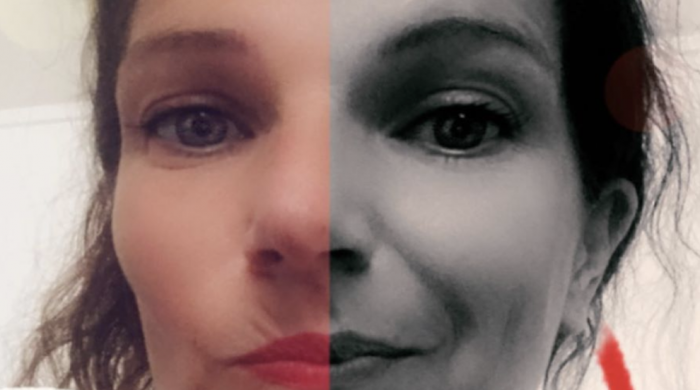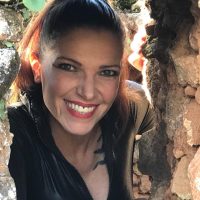Millions of people worldwide struggle with chronic pain and health issues every day, and many have had to put their plans and goals on hold indefinitely. Once broken, the dreams of these individuals can take a lot of energy to heal and continue.
Alex Olabarria is a positive and uplifting voice championing those whose lives have changed irreversibly, in the face of pain and illness.
After being forced to give up the career she loved, she resolved to help others to overcome the daily challenges of chronic pain and life-altering illness.
I had an in-depth conversation with Alex, where she spoke from the heart about her challenges with a perspective I had not heard before. The following is a transcript of Alex’s words.
~
It’s easy to think of love, children, and opportunity as gifts from the universe—but there are dark gifts, too.
How does pain and chronic illness change us, and even make us tougher and wiser than we ever could have imagined?
I was a promising young dancer/singer who had played Cosette in Les Miserables at the amazing 15,000-seat Sheffield arena, who had danced with numerous productions and ballet companies, when I became chronically ill. My entire life disappeared overnight.
When I thought about my future before I got sick, I saw glittering stages, worldwide travel, and finding my soul mate. When I realised these things were now impossible—happening for others but not for me—it was as if someone had pulled the stage curtain down. Behind it was only a bland hospital bedroom, a wheelchair, and a nurse, instead of my “real” life.
Everyone who suffers from chronic pain or illness must adjust their lives and expectations around their condition, and this forces them to face up to things that most people try to avoid. While almost no one would consciously choose this path for themselves, ancient traditions have always recognised that the path of suffering leads to enlightenment and wisdom. This means that chronically ill and disabled people like myself have faced some dark situations and energy head-on, and lived to tell the tale.
A “Spoonie” is someone who is chronically ill and/or disabled, in a way that affects their everyday energy and pain levels. They must portion out their energy in units or “spoons” to avoid burnout. Being ill or disabled is tiring, and Spoonies need to take their rest and self-care seriously.
Millions of people all over the world are dealing with pain and illness daily, but we hardly ever talk about how they cope with it. In fact, most of the world actively ignores it a lot of the time. It’s not fashionable to be frail, tired, or sick, when we’re supposed to worship youth, health, and perfection. Spoonies are a reminder that we’re all human and vulnerable, which is why people often prefer us to smile and say nothing about it, if possible. Unfortunately, this means that non-Spoonies can mistake the chronically ill or disabled for delicate flowers who aren’t as tough or capable as the well or able-bodied. Some people even believe they’re lazy or deluded. Nothing could be further from the truth, as your average Spoonie deals with poor energy levels and chronic pain daily.
There is another part of being a Spoonie that almost nobody talks about, however, and that’s the dark truths that the chronically ill or disabled often deal with. Few of us would consciously choose a path of frustration or pain for ourselves or our partner, parent, or child, but we are transformed into wiser and stronger human beings by these challenges. It’s about time we celebrated this transformational process and honoured the incredible strength we all discover within, when we finally accept the three dark gifts of pain and chronic illness.
I survived, I grew, and, eventually, I thrived. I’m still chronically ill, and I’m never going to get better. However, I am not broken, and I am more alive than ever.
Here are the three gifts I had to accept in order to get to that point:
The Gift of Mortality
“In the midst of life, we are in death.” I believe that you can divide everybody in the world into two camps: people who are scared by this quote and people who are inspired by it.
Nobody wants to think about dying. When I began to write this article, I initially scrubbed this paragraph out. It’s harsh and close to the bone, and I’m usually an upbeat and happy sort of person. This notion of the finality of death doesn’t seem to fit too well with my everyday persona, and yet…
It’s my brush with death that makes me this way. When you have a chronic illness, whether it’s life-threatening or not, it’s like having Death himself breathing down your neck. Sometimes Death is standing way over on the other side of the road and you can forget all about him for a while—days or even weeks. Other times, he’s right next to you, as if he’s standing in front of the TV and taking up all the air in the room. It’s like having a big spot on your nose or a bad haircut—you just end up making peace with it eventually, and life goes on regardless.
Confronting this reality made me absolutely determined to get on with my life. It made me less fearful and more confident. It made me appreciate the beauty in small things. It made me think of how I can make this short time on earth happier, for myself and others. Finally, it made me actually get off my butt and actually do stuff.
I wrote a book. I made myself walk again. I started a business. I reached out to others to lift them up as well, because once I’d made it through what felt exactly, precisely like my own personal version of the Valley of Death, I wanted to reach back and pull everyone else through with me. I still have fear, but I’m not an overall fearful person anymore.
Accepting the Gift of Mortality
Accepting and coming to terms with mortality, death, and endings can be deeply uncomfortable at first, and it’s worth considering exploring this with a therapist, rather than simply plunging straight in. Once you come to terms with it as best you can, this can be a source of enormous inner strength and power.
Go easy on yourself when you’re accepting this dark gift, and notice how death and endings in general are deeply connected with all other things. When deep emotions connected with mortality surface, honour them and ensure that you balance them with life-affirming.
The Gift of Grief
Grief makes people extremely uncomfortable. If you tell someone you are grieving, they will often try to minimise your feelings with phrases like “It wasn’t meant to be.” People want to be kind and make you feel better, but grief is much bigger than words.
Grief isn’t always the result of a bereavement, and chronically ill people have all had to deal with a certain type of grief at some point. If this is unresolved, it can be as debilitating as pain or fatigue.
My own grief was the sense of loss of the chronically ill person. Sadness and longing for everything that I lost and everything I knew was lost to me in the future. For the person I wouldn’t get to be and the friends and opportunities I would lose because of my illness and disability. I was so incredibly sad about this, I could physically feel it in my body alongside the pain.
While I believe that whatever its cause, grief is the most terrible emotion a person can experience, if you have a chronic illness, then you have already been through that. It’s never too late, however, to start to treat your grief seriously, to listen to and honour it. To mourn the version of you that you didn’t get to be, so that you can fully embrace the living, breathing you.
Accepting the Gift of Grief
Grief has some distinct stages, and while they don’t always happen in a strict order, you can go and look them up and see where you are up to with your own grief. Maybe you’re stuck in the angry stage, or you’re feeling numb about it all, or perhaps you’re nearing the end of your healing and you’re on the edge of acceptance. Wherever you are, it’s simple and helpful to identify exactly where you feel that you are in the long and difficult process of grieving your healthy self.
The Gift of Transformation
We all crave transformation. We want to grow up and become adults and parents, and so on. We wish to transform from a student to a professional, or a fearful person to a braver one. However, all types of dramatic transformation are painful and scary. Each time a lobster sheds its shell, it is extremely vulnerable. We’re not so different.
The hardest transformations are the ones we didn’t choose to make. We can deal with almost any amount of pain or suffering if we’re focused on the end result. If this weren’t true, nobody would ever get pregnant, train for the Olympics, practise ballet until their feet bleed, or undergo gender transition. When we have a goal that aligns with who we feel we really are and how things ought to be, we’re more at peace with the pain of transformation.
The opposite is true of an unwanted transformation. Chronically ill people know that they are transitioning into a version of themselves that they didn’t ask for, and they’re angry and frustrated about it. For me, this was the hardest lesson of all, and it cuts me to the bone.
Accepting the Gift of Transformation
I had an idea in my head of who I was going to be, and I know that my younger self would have been horrified, upset, and deeply disappointed to find out that I turned out differently, because of my chronic illness. However, I had to learn to let my inner 12-year-old self rage and cry and get over it. I had to also allow my inner 15-year-old self to come to terms with not being a dancer, although I didn’t stop until I was 19, which, when I look back now, I really really made things worse (she was upset about this, but she’s over it now!).
Transformation—the “good” kind—happens when you can align yourself with a version of yourself right now that is better and more healed and happier than your current self. You cannot do that if you are holding onto how you think things should have gone. Let go of all of it, even if it makes you angry or sad for a while. Again, therapy or counselling is advisable, but at the very least be gentle with yourself for a while.
You don’t have to have a chronic illness to get to grips with these three profound and difficult stages of life. They can manifest in many ways in our lives. It just so happens that all three of them often go hand in hand with pain, disability, and chronic illness.
We “Spoonies” are warriors, and just as our pain and fatigue is valid, so is the wisdom and strength that we’ve acquired along the way. We might look at things a little differently than non-Spoonies do, and have slightly differing priorities and feelings about things, but that’s because we had to grow bigger as our world got smaller. We’re some of the toughest, wisest humans on the planet, because we had to return some of the bright gifts we picked out for ourselves and accept the dark gifts instead.
That’s okay. We’re still here, and sometimes we just need to remember the dark stuff we’re capable of dealing with, in order to experience the brighter side of life too.











Read 1 comment and reply